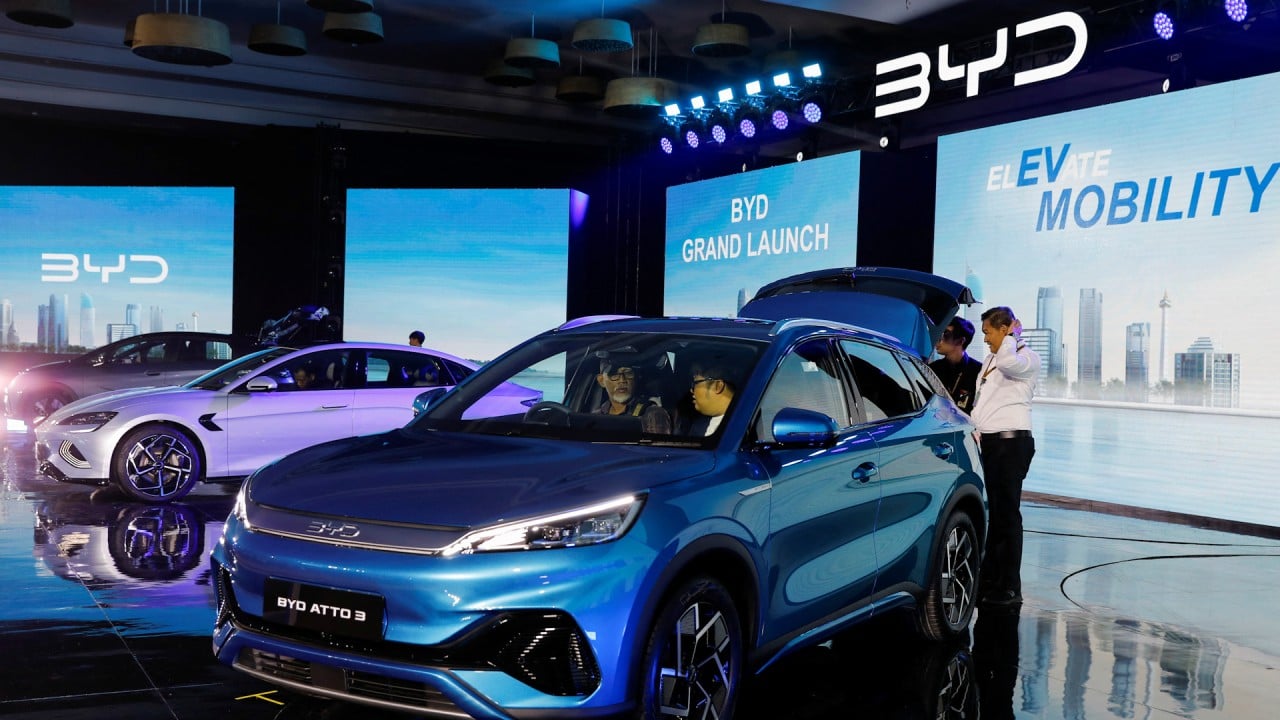Also this week ahead of the “two sessions” annual parliamentary meetings, the China National Democratic Construction Association – a minor political party – said it planned to approach the Chinese People’s Political Consultative Conference advisory body about the EV issue, according to Chinese news agency Cailianshe.
As US, EU anxiety grows, will overcapacity curb exports of China’s ‘new three’?
As US, EU anxiety grows, will overcapacity curb exports of China’s ‘new three’?
The party proposed seeking mutual recognition for EV “standards” with the European Union, bolstering the intellectual property rights of Chinese firms overseas and improving trade-linked logistics.
Chinese EV makers receive “generous government subsidies, which have helped to lower production costs”, Moody’s Analytics said earlier this month.
Western leaders see China’s giant EV industry, led by the likes of BYD and Nio, as a threat to their smaller firms.
Chinese investors are increasingly facing political backlash in host economies
About three quarters of the US$28.2 billion in Chinese EV value-chain investment overseas last year went to Europe, the Middle East, North Africa, as well as other parts of Asia, the Rhodium Group research organisation said in an industry outlook on Thursday.
“The EU could make regulations that pose obstacles to the sale of Chinese EVs on the European market,” said Yun Sun, director of the China programme at the Stimson Centre think tank in Washington. “They could also challenge Chinese EVs as a national threat.”
The Rhodium Group pointed to growing discontent overseas.
“Chinese investors are increasingly facing political backlash in host economies, most notably the US, which is trying to limit Chinese influence over its EV supply chains,” the outlook said.
And China’s protests to the EU and the chamber of commerce’s proposed measures to help Chinese firms would not ease the backlash, said Alicia Garcia-Herrero, chief economist for Asia-Pacific at French investment bank Natixis.
“It’s not convincing,” Garcia said. “It’s not going to help unless they radically change their proposals.”
Overcapacity in China stands to push more factory output of EVs and batteries into foreign markets at lower prices.
But Chinese EV investment abroad should “remain strong” this year as it shifts from battery investment to EV manufacturing in Europe, Latin America and around Asia, the Rhodium Group outlook added.
‘Just the beginning’: Chinese EVs face uphill path as US, EU put down roadblocks
‘Just the beginning’: Chinese EVs face uphill path as US, EU put down roadblocks
And companies along the Chinese EV supply chain may already have a solution to the resistance in Europe, the report suggested.
A “key driver” for business this year is “host economies’ demands for higher value-added and job-creating investments in return for market access,” the outlook said.
In Finland, according to the report, Chinese lithium battery material producer Ningbo Shanshan announced investments in a plant worth US$1.35 billion, while Beijing Easpring has formed a US$844 million joint venture with Finnish Minerals Group to make battery materials.
Rhodium Group said 92 per cent of Chinese investment in EV-related industries in Europe last year went to Finland, Hungary and Sweden.
China continues to be an input and a business partner
Timo Kantola, the Finnish consul general in Hong Kong, said EV battery projects favoured Finland due to the availability of some of the “rare” minerals required.
And some projects have accepted Chinese “partners and participation”, he added.
“China continues to be an input and a business partner,” Kantola said, but Finland, like other European countries, is still “looking at vulnerabilities and being aware” of China’s role.
Beijing policymakers, though, may eventually rein in the EV supply chain, the Rhodium Group said.
They are “growing concerned” about reverse technology transfers and “value-added” clean tech production moving abroad when China “urgently needs to build up new drivers for economic growth at home”, the outlook added.


